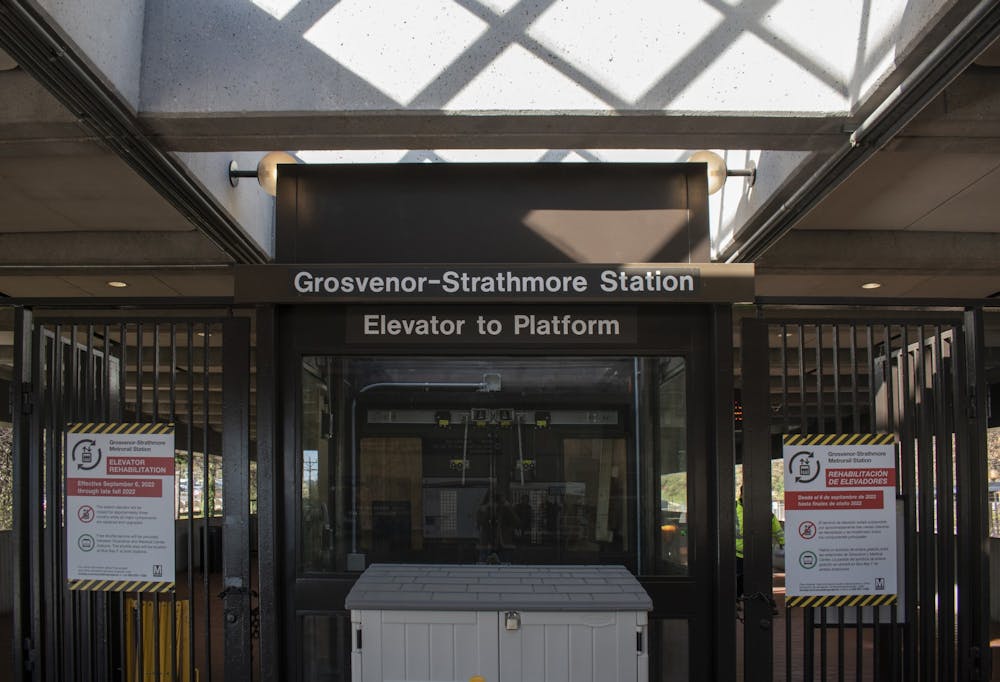On Sept. 6, Fiona Murphey’s daily 30-minute commute to American University turned into a five-hour-long nightmare. After that, she started a petition to fix the Grosvenor elevator.
For the past two and a half months, the elevator to the Grosvenor-Strathmore Metro station has been closed for renovations, leaving wheelchair users unable to reach the station — a key stop on the Red Line. The Washington Metropolitan Area Transit Authority closed the elevator for a rehabilitation project that they stated on their website will upgrade all major components of the elevator, replacing the motors, safety devices, controls and passenger cab. The website also said the downed-elevator advisory would last until Nov. 30.
Murphey, a graduate student in the School of Communication, uses a wheelchair. She lives off campus and uses the Grosvenor-Strathmore station to get into D.C. The unserviceable elevator often adds hours to her commute, which she makes up to 12 times a week.
“I missed quite a lot of in-person instruction and I missed a paying job on campus,” said Murphey. “I missed quite a lot of hours as a result of these issues.”
Realizing that the renovations were disrupting her daily life, Murphey decided to do something about it. On Oct. 30, she created a Change.org petition addressed to WMATA, City of Rockville Mayor Bridget Newton, D.C. Mayor Muriel Bowser and Montgomery County Councilmember Andrew Friedson. Murphey demanded that the elevator be fixed immediately, the handling of the shuttle system and its drivers be improved and any future elevator rehabilitation projects be undertaken quickly and in a more well thought-out manner.
WMATA announced the current renovations on Sept. 2, giving Murphey just four days to plan her alternate commute to AU’s campus after classes began on Aug. 29. WMATA’s website stated it would provide a free shuttle service to the nearby station and back every 15 minutes up to an hour after the trains stopped running. However, the shuttle system did not meet these promises, Murphey said, which frequently left her stranded at the Medical Center station.
“There was a time when my sister and I were in the cold for about an hour and a half,” said Murphey. “The shuttle never came.”
Metro offers full shuttle services to those who need them. An applicant must have a disability as defined by the Americans with Disabilities Act and be unable to use the Metrorail or Metrobus system some or all of the time as a result of their disability; need to use a ramp or wheelchair lift to board or exit a public transit vehicle, but an accessible public transit vehicle is not being used at the time, date and on the route one would travel; or be unable to travel to or from a bus stop or rail station due to a disability, or an accessible pathway to a bus stop or rail station is unavailable, according to WMATA’s website.
The application for the MetroAccess Paratransit system requires an in-person visit and up to 21 days to process. After filling out and submitting her eligibility form, Murphey said she received a notification that it would take up to 60 days to process.
“It was the day that I got that reply that I decided to launch the petition,” Murphey said.
Almost immediately after she published the petition, Murphy noticed a response. Within a few days, she was contacted by WMATA and asked questions about her experiences with the shuttle system. Her application for the MetroAccess was also approved within the week, she said.
“The goals of the petition were to draw attention to this access issue, both specifically of the downed elevator and shuttle issues,” Murphey said. “Generally, Metro was not taking care of their disabled customers. For me, it was about building this community support.”
To maintain their elevators, WMATA’s website states that they will do “full rehabilitation work every 10-15 years” to ensure that the elevators stay safe and up to date. In 2021, Metro promised to replace 130 elevators across 32 stations by 2028, meaning that there are likely to be other elevator closures throughout D.C. for the next six years.
The elevator was set to become operational again by the end of November. However, on Nov. 28, Murphey said she received an email from WMATA’s accessibility compliance advisor which stated that the elevator to the Metro platform would not re-open until Dec. 23. The WMATA’s service status website confirms this new date.
If Murphey reaches 500 signatures, her petition has the potential to not only affect the Grosvenor-Strathmore elevator closure, but over 100 more closures in the near future. She has the goal of amending WMATA’s policies and priorities, but also wishes to educate the community about the prevalence of institutional ableism and access issues.
“If you care about your fellow citizens, this is important,” said Murphey. “Because there are far more than you know who are affected by this.”
Murphey launched her petition with the support of the AU Disabled Student Union, partnering with president Henry Jeanneret, a junior in SOC and the College of Arts and Sciences.
“There is clearly an issue here, and there’s a clear way to fix it, and part of the way to get this the attention that it deserves is to have people sign this petition and talk about it,” Jeanneret said.
Murphey said the feeling of empowerment she needed to create this petition for change came from the community of disabled students and allies at AU.
“Honestly the support of the Disabled Student Union at AU was the primary thing,” Murphey said. “I, for a long time, did not feel empowered to speak out about issues facing disabled people specifically until I was able to find this community that let me know that our issues are important, our lives are important and ableism is very, very, real.”





